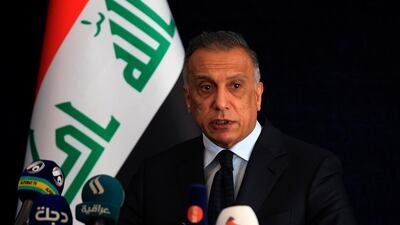Today, Iraqi Prime Minister Mustafa Al Kadhimi is due to meet US President Donald Trump in Washington. The two leaders are expected to further a US-Iraqi strategic dialogue that began in June and encompasses a number of issues, including diplomatic, trade and business ties, in addition to security co-operation.
At a time when international air travel has been largely halted following the outbreak of Covid-19, thereby limiting most diplomatic exchanges to video conference calls, it is significant that Mr Trump has invited Mr Al Kadhimi to the White House.
The visit underlines the importance that the Trump administration accords its ties with Mr Al Kadhimi’s three-month-old government. Mr Al Kadhimi came to power at a time when Iraqis had been calling for reforms to quell corruption, protect Iraq's sovereignty, create economic opportunities for young people and strengthen state institutions. The US is keen to ensure that the Iraqi state is able to govern, which means limiting militia rule and ensuring ISIS does not make a comeback.
Furthermore, the American support to Mr Al Kadhimi comes within its broader efforts to contain and constrain Iran’s expansionist policies across the Middle East, not least inside Iraq. The visit also speaks to the Iraqi Prime Minister’s desire to balance tensions between Washington and Tehran; both capitals exert leverage in Baghdad’s corridors of power, but have become increasingly adversarial towards one another in recent months.
Perhaps most crucially, however, Mr Al Kadhimi's visit represents a re-calibration in US-Iraqi relations, following a chain of events, including the storming of the US embassy in Baghdad last December by Iranian-backed Iraqi militias and the consequent killing of the Iranian commander Qassem Suleimani and the Iraqi militia leader Abu Mahdi Al Muhandis by a US drone strike in the Iraqi capital in January. These events led to the Iraqi Parliament, dominated by Iranian-aligned political parties, to pass a bill ordering US forces out of the country.
And yet, as much as it will serve to reset relations, it is important that today’s meeting not be limited to a session of grip and grin. In addition to renewed commitments to security co-operation, Iraq is desperately in need of American economic assistance. Baghdad has sought aid to grapple with the fall in oil prices – about 90 per cent of the energy-rich country’s budget comes from oil revenues.
At the same time, a healthy dose of realism is also needed. Mr Al Kadhimi should not expect an impressive American bailout, given that the world at large has fallen on hard times due to the pandemic. The impact has been particularly acute in the US, limiting Washington’s ability to pull its purse strings. Absent of the ability to provide adequate aid, the Trump administration should extend credit lines and facilitate more private American investment in Iraq.
Yesterday, however, the US announced nearly $204 million in additional humanitarian assistance, bringing the total to more than $706m since the beginning of fiscal year 2019. In addition, Washington provided $49.5m in Covid-19 assistance. Iraqi Foreign Minister Fuad Hussein, meanwhile, said he was expecting to sign MoUs in various sectors, including education, health, oil and power.
Beyond economic support, it is paramount that Washington throws its support behind Mr Al Kadhimi's reform agenda, which includes delivering stability, a functioning democracy, government accountability, sovereignty and, eventually, prosperity in Iraq. For years, the US has viewed Iraq through the prisms of counterterrorism and checking Iran's strategic ambitions. It should do more than that by vociferously endorsing the vision that the Prime Minister has promised to ordinary Iraqis. That the people want change is evident from the months-long demonstrations throughout the country, and it is important for the US to recognise this.
With the presidential election just two months away, few expect Mr Trump will have the time or political capital to lead a global campaign to support Iraq. But he should at least call for international support, particularly from Europe and Arab neighbours, and recognise the noteworthy steps Mr Al Kadhimi has taken since May.
He has responded favourably towards the protests by reaching out to the protesters. He has detained government security personnel allegedly responsible for the murder of some demonstrators. He has also moved to repair frayed relations with the semi-autonomous Kurdistan Regional Government in Erbil.
Significantly, Mr Al Kadhimi has announced early elections, to be held next year, in the hope that a new, more diverse and independent-minded Parliament will help bring about the reforms the Iraqi people are calling for.
Until that happens, however, the Prime Minister knows his hands are tied by those with vested interests. He does not belong to any political party, nor does he have the backing of any militia group, in a country where militias still wield considerable clout – and pose a serious security threat not just to ordinary Iraqis, including those out on the streets protesting, but also the US forces stationed in the country.
Mr Trump has taken the right step by inviting Mr Al Kadhimi to Washington. But it should be the first of many steps towards a shared goal to rebuild Iraq.












